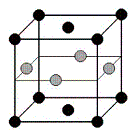Department of Physics and Astronomy: Publications and Other Research

Ralph Skomski Publications
Document Type
Article
Date of this Version
7-2013
Citation
IEEE TRANSACTIONS ON MAGNETICS, VOL. 49, NO. 7, JULY 2013; DOI: 10.1109/TMAG.2013.2247386
Abstract
It is investigated how magnetic hysteresis is affected by finite-temperature excitations, using soft regions in hard-magnetic matrices as model systems. In lowest order, magnetization processes are described by the traditional approach of using finite-temperature materials constants such as K1(T). Nanoscale excitations are usually small perturbations. For example, a Bloch summation over all magnon wave vectors shows that remanence is slightly enhanced, because long-wavelength excitations are suppressed. However, a reverse magnetic field enhances the effect of thermal excitations and causes a small reduction of the coercivity. To describe such effects, we advocate micro-magnetic calculations where finite-temperature fluctuations are treated as small corrections to the traditional approach, as contrasted to full-scale Monte Carlo simulations.


Comments
Copyright 2013 IEEE. Used by permission.